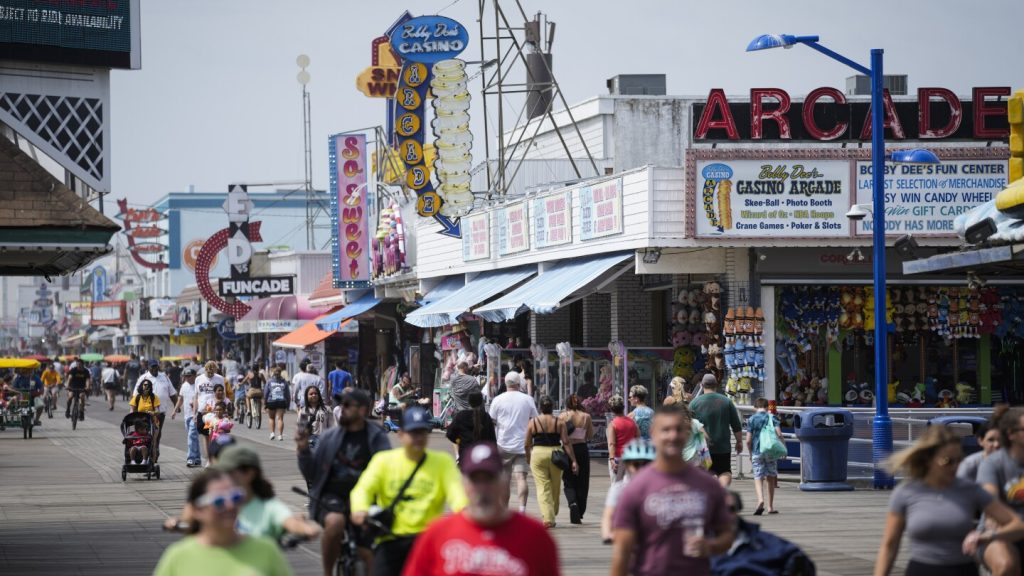NEW YORK (AP) — Small businesses along popular vacation destinations like U.S. boardwalks and piers say the number of tourists Beach attendance has returned to normal, that is, to pre-2020 levels. But while the wealthy are spending lavishly, lower-income vacationers are sticking to carefully planned budgets.
Sean Bailey, marketing director for the SkyWheel observation wheel near the Myrtle Beach Boardwalk and Promenade in South Carolina, said ticket sales for the 13-year-old attraction have exceeded 2019 levels since 2021 and so far this year are slightly above 2023 levels.
Bailey has noticed that tourists who buy the cheapest tickets — which have increased from $18 to $21 this year — are planning ahead and buying online instead of walking to the 200-foot attraction. A typical ride, or “flight,” on the SkyWheel, which features glass gondolas that can hold up to six people, lasts 10 to 15 minutes.
At the other end of the spectrum, the more expensive tickets have become more popular. There are $35 Sunrise tickets and $109 VIP tickets that include up to four people and allow the buyer to enjoy a 30-minute flight. SkyWheel also offers a $250 gender reveal package that includes a light show and a ride for up to six people.
“People are looking for more enriching experiences beyond just the regular flight,” Bailey said.
According to the U.S. Travel Association, tourism volume in 2024 is expected to surpass 2019 figures for the first time since the pandemic began, with 2.45 billion trips taken, compared to 2.38 billion in 2023 and 2.40 billion in 2019.
Domestic tourism is rebounding faster than international tourism. U.S. domestic travel spending, which includes general travel spending and passenger fares, is projected to be $975.6 billion in 2024, or 98% of 2019 levels. International travel spending, at $153.9 billion, is about 83% of 2019 levels. Both are adjusted for inflation, according to the USTA.
Similar to the CEOs of large consumer-focused companiesSmall business owners say they see a spending divide among wealthy Americanswho have maintained their spending levels, and those in lower income brackets who are more cautious. Wall Street has posted double-digit gains last year and so far this year — even with some recent volatility — as wage increases have slowed and inflation remains a burden even as consumer price pressures have eased.
At Navy Pier, which juts out into Lake Michigan in Chicago, Robin Harris, owner of Confidence Apparel, which sells affirmation clothing, says traffic and sales are up this year compared with last. She says customers are more mindful of their spending, choosing clothes they can wear more than once and prioritizing quality over quantity. Her best-selling products include a $30 T-shirt in a variety of colors that reads, “Inhale Confidence, Exhale Doubt,” and a $75 jacket with a recipe-worthy list of ingredients, including “Love, Kindness, Courage and Resilience.”
“(Customers) are starting to be a little more intentional about what they buy instead of just buying anything and everything,” she said.
Elsewhere on Navy Pier, Robert Gomez owns Beat Kitchen Cantina, a Mexican food stand, and Bar Sol, a full-service restaurant with outdoor seating. He says sales at the food stand are up 30 percent over last year, with customers happy to spend $8 on a taco, up $1 from last year. Gomez has expanded his more upscale Bar Sol restaurant and made other improvements, so sales aren’t comparable.
Gomez also owns two music venues that serve food, located away from the tourist areas. He said that while tourists on the pier seem more than happy to pay $40 for an entree at Bar Sol, these neighborhood restaurants, which attract mostly Chicagoans, don’t see the same level of spending.
“Tourists come (to Bar Sol) with the intention of spending a lot, while local customers are looking for better deals,” he said. “It’s much more price-sensitive, it’s almost the other extreme. And so, I had a hard time making the comparison with neighborhood stores.”
At Laura's Fudge in Wildwood, New Jersey, which has been around since the 1920s, owner Dave Roach said sales of fudge, saltwater caramel and chocolate-covered turtles have increased every year since 2020. He said many customers, often families who have frequented the boardwalk for generations, save up year-round to have money to spend in Wildwood.
“They know what it's going to cost them and they don't mind spending the money,” he said.
Michelle Rutkowski, owner of Boardwalk Best and Five Mile Marketplace on the Wildwood, New Jersey, boardwalk, which sells beach gear and souvenirs, has seen her business fluctuate for decades because her family has owned businesses there since the 1980s.
Rainy weekends slowed activity in April and May. But things have picked up since then, especially after classes ended in mid-June.
Rutkowski said she feels positive about sales momentum this year, with shoppers spending money on souvenirs like key chains, magnets and T-shirts featuring Wildwood, New Jersey's unofficial mascot, a seagull with a French fry in its mouth.
“People have budgeted reasonably for their vacations and they are spending it,” she said. “This may not be the year they get back to 100% of what they were before, but we are definitely on that trajectory.”


